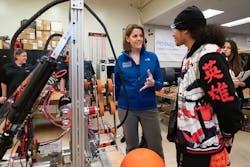Casting a Wide Net to Attract Manufacturing Talent
The light is a little too dim for Carolyn Lee, executive director of the Manufacturing Institute at the National Association of Manufacturers (NAM.) She wants the industry to shine a brighter light on itself and attract the recognition it deserves.
“Unless you grew up in the industry, as I did, kids don’t even think of manufacturing as a career choice,” Lee observes.
Carolyn’s grandparents met in a pre-WWII manufacturing factory in New York. Her grandfather and her father, a mechanical engineer by training, ran a manufacturing plant when Carolyn was young.
Her background was certainly a large factor in her appointment to the executive director’s position in June of 2017. She was tasked to close the skills gap—no small feat.
According to Blake Moret, CEO of Rockwell Automation, Lee is up to the task. “She not only has subject matter expertise, but she is also a great collaborator,” Moret points out. “To achieve the goals of the Institute the executive director must be able to work with manufacturing companies and other organizations and she has proven to have an extraordinary talent for bringing together different perspectives and sources.”
Bringing together different sources, in this case, different potential workforce talent is Lee’s vision. And there is no time to waste. NAM’s 2019 second-quarter research found that more than one in four manufacturers had to turn down new business opportunities due to a lack of workers.
One of the Institute’s larger programs involves getting the attention of the younger generation. “They have no idea what’s going on inside the factory walls,” explains Lee. And if they saw the technology that goes into making the everyday products they use, she believes that would consider a career in manufacturing.
Having this direct contact with manufacturers is the basis of a key program of the Institute – Manufacturing Day. Since 2012 companies and educational facilities have been opening their doors to students. Manufacturing Day was founded by the Fabricators & Manufacturers Association.
This strategy is working. A study done in 2018 found that 64% of students who have attended an MFG Day event are more motivated to consider a career in manufacturing. And 84% are more convinced that manufacturing provides careers that are interesting and rewarding.
A large part of that interest is due to students experiencing first-hand how technology operates in the factory. New technology such as augmented reality (AR) and virtual reality (VR) are used in a variety of applications both in the plant and in training. “Since millennials are technology natives, we need to demonstrate to them that if they chose this field they will be working with cutting-edge technology on a daily basis,” says Lee.
Another way to appeal to this younger workforce is to understand their motivation. “To them, work isn’t only about a paycheck,” explains Lee. “This generation looks at the larger social implications of their work and this is where manufacturing can make an excellent case. A perfect example is manufacturing medical devices that are improving people’s lives.”
Another angle for recruiting talent, especially younger talent, is focusing on the creative angle of the work. This year NAM used the theme of "Creators Wanted" for its national manufacturing tour.
Varied Workforces
In addition to the millennials, Lee is focused on attracting both more veterans and women into the field.
The Institute has a program called Heroes Make America. The program, which began in 2018, is a full-time, 10-week career skills program that launched in partnership with the U.S. Army Soldier for Life.
Concentrating on hard-to-fill production jobs, the program began at Fort Riley in Kansas and has expanded to Ft. Hood in Texas. This year it will expand to two other bases. Manufacturers such as Koch Industries, Arconic, Parker Hannifin Corp. have all supported the program.
“Every year 200,000 people leave the military and join civilian life,” says Lee. “Many of the veterans have been working on high-tech machinery and equipment and have the knowledge that manufacturing so badly needs.”
Another group of workers who are still not represented in manufacturing at numbers the sector would like to see are women. Back in 2012, the Institute launched the Science, Technology, Engineering, and Production (STEP) Ahead initiative to showcase the impact of women in manufacturing. Over the past five years, STEP Ahead Award winners, 802 winners over the past five years, have impacted more than 300,000 individuals.
“Part of our mission in the STEP program is to help women feel good about their career choices which should encourage them to stay,” says Lee.
These and other programs are part of Lee’s multi-pronged strategy to attract workers to a field that she feels is not only rewarding but essential.
“Having the opportunity to run this organization is like a homecoming to me” Lee says. “I was raised believing that manufacturing was a central part of the U.S. economy. My Dad used to always say that our nation was strong due to its manufacturing base.”
About the Author

Adrienne Selko
Senior Editor - MH&L, IW, & EHS Today
Adrienne Selko has written about many topics over the 17 years she has been with Endeavor Business Media and currently focuses on workforce development strategies. Previously Adrienne was in corporate communications at a medical manufacturing company as well as a large regional bank.
She is the author of Do I Have to Wear Garlic Around My Neck? which made the Cleveland Plain Dealer's best sellers list. She is a senior editor at Material Handling & Logistics, EHS Today, and IndustryWeek.
Editorial Mission Statement:
Manufacturing is the enviable position of creating products, processes, and policies that solve the world’s problems. When the industry stepped up to manufacture what was necessary to combat the pandemic, it revealed its true nature. My goal is to showcase the sector’s ability to address a broad range of workforce issues including technology, training, diversity & inclusion, with a goal of enticing future generations to join this amazing sector.
Why I Find Manufacturing Interesting:
On my first day working for a company that made medical equipment such as MRIs, I toured the plant floor. On every wall was a photo of a person, mostly children. I asked my supervisor why this was the case and he said that the work we do at this company has saved these people’s lives. “We never forget how important our work is and everyone’s contribution to that.” From that moment on I was hooked on manufacturing.
I have talked with many people in this field who have transformed their own career development to assist others. For example, companies are hiring those with disabilities, those previously incarcerated, and other talent pools that have been underutilized. I have talked with leaders who have brought out the best in their workforce, as well as employees doing their best work while doing good for the world.
